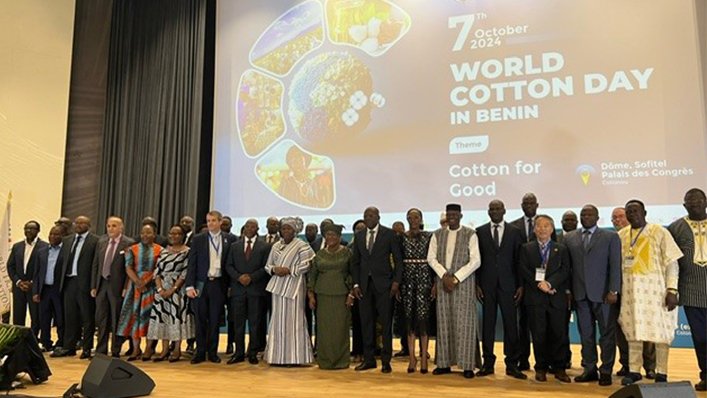
Held on African soil for the first time, this year’s World Cotton Day showcased Benin’s economic successes under the leadership of President Guillaume Athanase Talon, said Director-General Okonjo-Iweala. She praised Benin for its strong economic performance and the prudent management of its economy.
The Director-General emphasized the importance of cotton to the economies of West and Central Africa, particularly Benin, Burkina Faso, Chad, Mali and Côte d’Ivoire — collectively known as the Cotton4+ countries. As the largest cotton-producing region in Africa, these countries produce over 1 million tons of cotton annually, accounting for 50% of Africa’s total output and 4% of global production.
In terms of cotton trade, West and Central Africa ranks as the third-largest exporter after the United States and Brazil, contributing significantly to global trade, which has grown from USD 8.2 billion in 2003 to USD 23 billion in 2022, she noted.
Despite the high quality and environmentally friendly nature of African cotton, the sector faces significant challenges, from market distortions to climate change, DG Okonjo-Iweala said. She noted that 20 years ago, the Cotton4 countries made a call for action at the WTO against unfair trade practices in cotton. This led to cotton gaining a unique status within the WTO, with members regularly meeting to address both the trade and development aspects of the sector.
Regarding cotton trade, the Director-General emphasized the importance of levelling the playing field by reducing subsidies, which currently amount to USD 8 billion, to allow developing countries greater market access and enable them to benefit more from trade. She noted that WTO members have worked hard and will continue advancing negotiations to achieve this goal.
On the development front, she highlighted the significant progress made in supporting Cotton4 countries in enhancing their competitiveness and tapping into the vast potential of cotton markets, both in Africa and globally. “The African market for cotton alone is worth USD 12 billion. We are also exploring external opportunities, including the sports apparel value chain, which is expected to reach USD 250 billion by 2026,” she added.
The Director-General highlighted that new WTO-led initiatives are helping African cotton unlock its full potential, with the milestone “Partenariat pour le Coton” initiative, launched in February 2024, serving as a key example.
This initiative marks a significant step toward fostering public-private partnerships and empowering Cotton4+ countries to achieve sustainable transformation and advance up the value chain. The first phase of the initiative has already been completed, including a baseline study and thorough assessments of each country’s national priorities and challenges.
The baseline study estimated that Cotton4+ countries need to attract USD 12 billion in investment over the next decade to unlock the full potential of the sector, which could create 500,000 direct jobs, especially for women and youth, DG Okonjo-Iweala said.
To facilitate this much-needed investment, the WTO has mobilized resources and called on partners to provide financial and technical support for African cotton. This includes the signing of a joint declaration with the Islamic Trade Finance Corporation, the African Finance Corporation, Afreximbank, United Nations Industrial Development Organization, and the International Trade Center.
The Director-General also commended the regional textile and clothing industrial hubs established by Cotton4 governments and financial partners, highlighting the Glo-Djigbe industrial park in Benin, which “plays a crucial role in connecting Benin to global cotton value chains.”
Looking ahead, the Director-General stated that the partners of the Partenariat pour le Coton will prioritize assisting governments and financial institutions in developing concrete investment projects aligned with each country’s national priorities. She emphasized the need for increased investment in infrastructure, capacity building, product certification, and logistics to support the sustainable growth of the cotton sector.
The Director-General urged all partners of the Partenariat pour le Coton to seize the opportunity presented by the World Cotton Day event to strengthen cooperation and coordination, with the goal of delivering tangible improvements in the lives of cotton producers and traders.
WTO’s activities on World Cotton Day
WTO senior officials will be actively involved throughout the two-day event, contributing to thematic panel discussions and the Business Forum, which will focus on strengthening public-private partnerships to build a sustainable cotton-textile value chain.
The WTO website features a dedicated page for the event, including news, videos, and the programme: WTO | World Cotton Day 2024. Additional information on the history of World Cotton Day and previous celebrations is also available here: WTO | World Cotton Day: Celebrating the global importance of cotton.
Share
Reach us to explore global export and import deals